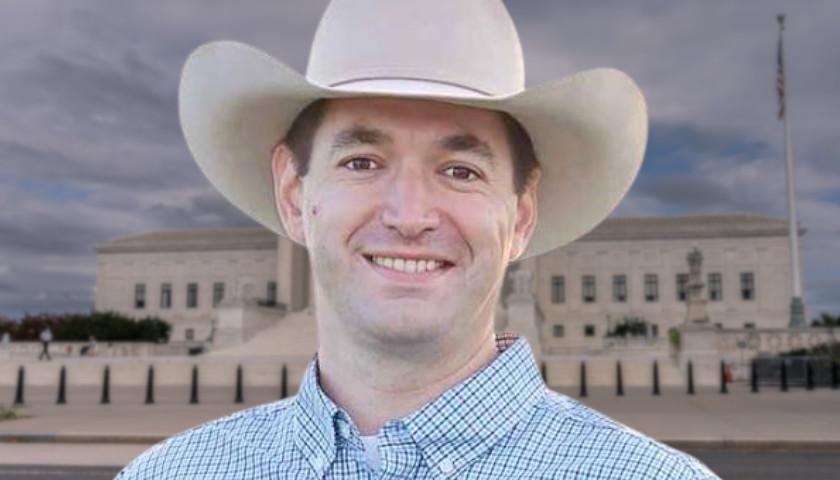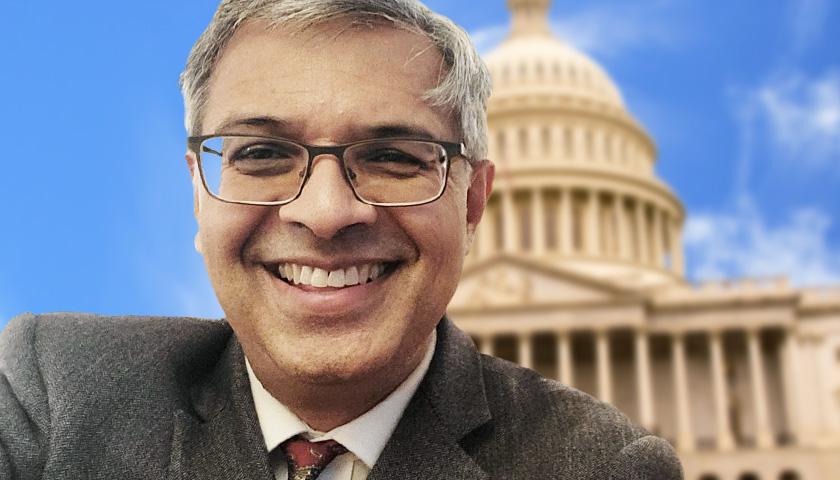by Katelynn Richardson
Montana Attorney General Austin Knudsen asked the Supreme Court Friday to hear a case that challenges a state agency’s efforts to police election-related “misinformation” on Twitter.
A group of nine attorneys general led by Knudsen (pictured above) filed an amicus brief Friday urging the Supreme Court to hear O’Handley v. Weber, a lawsuit challenging the California Secretary of State’s Office of Election Cybersecurity’s practice of flagging “false or misleading” election information for removal by Twitter. The states call the agency’s actions an “anathema” to the First Amendment and argue they reflect similar conduct occurring at the federal level.
The brief notes the states’ interest in ensuring their citizens are “not silenced on social media through the actions of government officials in other States.”
 “Unlike the private platforms, the government has very powerful incentives to monitor certain kinds of social media speech online and demand that private speech be taken down—namely, private speech that criticizes the government and contradicts its preferred narratives,” the attorneys general wrote. “If that speech arguably violates a platform’s terms of service, the government has a golden opportunity to censor it by proxy.”
“Unlike the private platforms, the government has very powerful incentives to monitor certain kinds of social media speech online and demand that private speech be taken down—namely, private speech that criticizes the government and contradicts its preferred narratives,” the attorneys general wrote. “If that speech arguably violates a platform’s terms of service, the government has a golden opportunity to censor it by proxy.”
Former entertainment lawyer and current conservative political commentator Rogan O’Handley, who filed the lawsuit in 2021, was allegedly censored and ultimately banned by Twitter after the agency flagged his account about 2020 election fraud as disinformation. The Ninth Circuit ruled against him in March, citing California’s “strong interest in expressing its views on the integrity of its electoral process.”
“No one’s voice should be silenced because of their political opinions or commentary on social media, which functions as today’s ‘modern public square,’” Knudsen told the DCNF. “Government cannot hide behind Mafia-style tactics or collusion with Big Tech to engage in viewpoint censorship. The Supreme Court should take up this case and stop the attack on free speech in the United States.
What the government dismisses as misinformation “all too often turns out to be true, or at least highly credible,” the attorneys general note, citing the COVID-19 lab leak theory, the Hunter Biden laptop story, the claim that COVID-19 vaccines do not effectively prevent transmission or infection and the claim that voting by mail presents a greater fraud risk than in-person voting.
“The common thread is that all these claims are true, or at least eminently defensible. Now, as at every other time in history, government officials seeking to silence private speech are not motivated by truth,” the brief states. “They care about power—preserving and expanding the power of the censors and those whose views they favor.”
Moreover, the brief contends that the California agency’s actions are not isolated events.
“Recent evidence in parallel litigation involving the States of Louisiana and Missouri has revealed that mass-flagging operations like the one in this case are endemic at the federal, state, and local level,” they wrote. “Government officials just can’t seem to get enough of the power to silence disfavored viewpoints on social media.”
At the federal level, the Cybersecurity and Infrastructure Security Agency (CISA) — in addition to regularly meeting with social media platforms and other government agencies about censorship, similarly performed “switchboarding” work that allowed state and local election officials to flag misinformation for it to report to platforms, the Missouri v. Biden lawsuit revealed.
The Fifth Circuit recently considered an injunction issued by a district judge in the lawsuit, which blocked government officials from communicating with social media platforms for the purposes of censoring protected speech. During the hearing, judges responded to the government’s arguments against the injunction with skepticism, with one comparing the Biden administration’s relationship with social media platforms to the mob.
– – –
Katelynn Richardson is a reporter at Daily Caller News Foundation.
Photo “Austin Knudsen” by Austin Knudsen.





